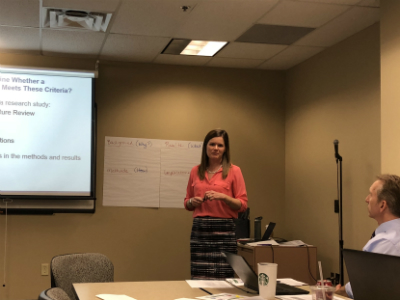Identifying and Applying Evidence-Based Practices: Training for State Education Staff
How can state education agencies identify and apply effective practices to achieve their goals? Education research can point to beneficial practices, but finding relevant research can be a difficult and time-consuming process. Even when education staff find appropriate research, it can be tricky to determine the strength and rigor of research evidence behind an intervention. The Midwest Comprehensive Center (MWCC) partnered with Minnesota Department of Education (MDE) leadership to help state education staff understand research design and identify evidence-based practices aligned to the Every Student Succeeds Act (ESSA) tiers of evidence. Building on a training series developed by Regional Educational Laboratory (REL) Midwest, MWCC and MDE held a training session in September 2018 to give MDE staff hands-on experience with identifying research quality and relevance. The State Support Network supported initial coordination for this training through a project that provided content expertise on an evidence-based practices list that MDE is compiling.
David English, senior technical assistance consultant with MWCC, explains why research design and quality are top priorities for state education staff: “A few forces are converging in the field to promote research-based practices. ESSA includes a new research evidence requirement. Schools identified as low performing or receiving particular federal funds are required to demonstrate that they are using evidence-based practices.” Other legislation, including the Perkins Act, which outlines federal funding for career and technical education, also promotes the use of evidence-based practices. English notes that these legislative changes were driven by the field: “The federal law updates had roots in the critical mass of best practice and research literature pointing towards the need for more systematic integration of evidence-based practices in education. There were previous requirements around ‘research-based’ practices, but they weren’t as rigorous as the current requirements.”
MWCC and MDE began planning the September training to support ESSA implementation. The 2018–19 school year is the first year in which districts must start implementing school improvement plans based on the previous year’s ESSA accountability results. English explains, “States are starting to release report cards based on ESSA accountability measures; now they need to dig in and start developing and implementing school improvement plans that include at least one evidence-based practice.”
To help districts create accountability plans, MDE staff needed to understand what qualifies as an “evidence-based practice,” which is why MDE requested the MWCC training. Training attendees included regional school improvement staff who coach districts, deputy director-level staff, curriculum staff, and other MDE staff who work on Title II funding and other instructional areas.
One big challenge for MWCC was ensuring that they were providing relevant and actionable information in the training. As English describes, “The concept of evidence-based practices is sophisticated to train around, because the definitions in the ESSA law are fairly technical. You have to find the balance between providing technical information and sharing practical takeaways.” This balance is where the collaboration between MWCC and MDE leadership was so crucial. According to English: “We needed to be in regular contact with MDE to make sure we weren’t getting too into the weeds, but make sure that we were providing enough information. Different MDE staff have different levels of experience with research.”
 English and MWCC senior researcher Lyzz Davis started the training by providing a technical presentation about research design. English and Davis then provided a tutorial on evidence-based practices and how to use the What Works Clearinghouse (WWC) to find those practices. The culminating activity allowed MDE participants to practice applying ESSA tiers of evidence to journal articles. English explains that it’s important for state education staff to be able to discern evidence levels on their own, rather than relying on online clearinghouses: “State staff may come across research that isn’t in the WWC, so they need to have some ability to assess the research quality on their own and determine how they might apply the research or take the next steps with it.”
English and MWCC senior researcher Lyzz Davis started the training by providing a technical presentation about research design. English and Davis then provided a tutorial on evidence-based practices and how to use the What Works Clearinghouse (WWC) to find those practices. The culminating activity allowed MDE participants to practice applying ESSA tiers of evidence to journal articles. English explains that it’s important for state education staff to be able to discern evidence levels on their own, rather than relying on online clearinghouses: “State staff may come across research that isn’t in the WWC, so they need to have some ability to assess the research quality on their own and determine how they might apply the research or take the next steps with it.”
MDE staff appreciated participating in the training. On the feedback survey, multiple participants appreciated the explanations of the ESSA evidence tiers and research terminology. One participant said the MWCC facilitators did a “good job with a mixed audience,” reaching people with different levels of familiarity with research. Another participant said that it was “great to learn together and allow questions and discussion in real time.”
So how will MDE staff use what they learned in the MWCC training? English explains how the training is improving an existing resource: “MDE is building on the training by refining their list of evidence-based practices. The state provides the list to districts as school improvement guidance, but previously the list did not have framing regarding selecting practices. Thanks to the information shared at our training, MDE staff can go through the research and determine how the highlighted practices map to tiers of evidence.”
In addition, some MDE staff work directly with districts to create school improvement plans. The training will help state staff and their district partners determine the level of evidence supporting current practices and whether there are other evidence-based practices they should consider. By providing background and hands-on experience with identifying evidence-based practices, MWCC and MDE leadership are equipping state staff to support district planning, school improvement, and ultimately student outcomes. MWCC will continue to support MDE’s understanding and use of research-based practices throughout the school year.
Trying to determine the level of evidence behind an intervention? Check out REL Midwest’s crosswalk between research clearinghouse standards and the ESSA tiers of evidence!
